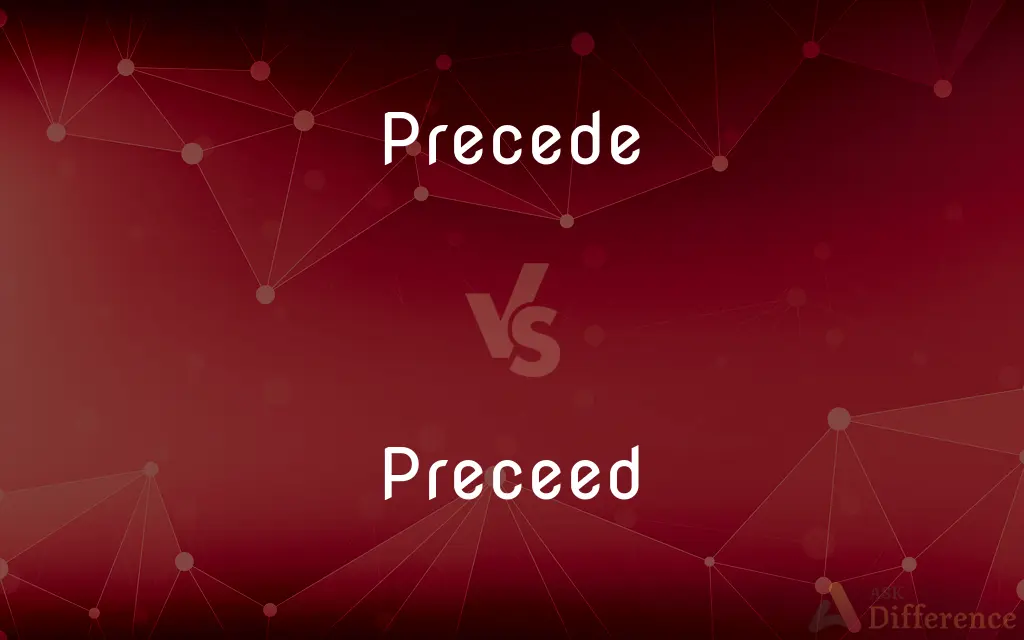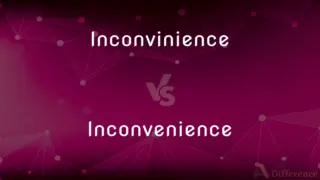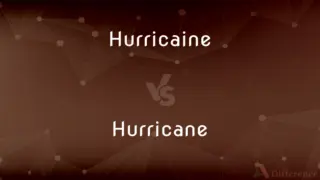Precede vs. Preceed — Which is Correct Spelling?
By Tayyaba Rehman & Fiza Rafique — Updated on March 19, 2024
The correct spelling is "Precede," while the incorrect version is "Preceed." Precede means to come before something in time, place, or order.

Table of Contents
Which is correct: Precede or Preceed
How to spell Precede?

Precede
Correct Spelling

Preceed
Incorrect Spelling
ADVERTISEMENT
Key Differences
Break it down as "pre" + "cede" to remember the parts.
Think of "precedent," which also starts with "prece," to remember that it's not spelled "preceed."
"E" comes before another "E" in the correct spelling, mirroring how the word "precede" means "to come before."
Recall that "cede" means to yield or give way, aligning with the meaning of "precede."
Write it correctly multiple times to cement the spelling in your memory.
ADVERTISEMENT
How Do You Spell Preceed Correctly?
Incorrect: A brief meeting will preceed the conference.
Correct: A brief meeting will precede the conference.
Incorrect: The introduction should preceed the main text in the book.
Correct: The introduction should precede the main text in the book.
Incorrect: The ceremony will preceed the dinner.
Correct: The ceremony will precede the dinner.
Incorrect: Thunderstorms often preceed the rain.
Correct: Thunderstorms often precede the rain.
Precede Definitions
Precede means to come before something in time.
The thunder preceded the rain.
Precede can refer to being in front of or ahead of in physical location.
The introduction precedes Chapter 1.
Precede implies a preexisting condition or cause.
Emotional trauma often precedes substance abuse.
Precede is used to indicate superior rank or position.
His reputation precedes him.
Precede means to cause or initiate an action or event.
Concerns about safety preceded the policy change.
To come, exist, or occur before in time
A lecture preceded the movie.
To be in front of or prior to in order
A precedes B in the alphabet.
To go in advance of
A marching band preceded the float.
To preface; introduce
Preceded her lecture with a funny anecdote.
To be before in time, order, or position.
(transitive) To go before, go in front of.
Cultural genocide precedes physical genocide.
(transitive) To cause to be preceded; to preface; to introduce.
(transitive) To have higher rank than (someone or something else).
Brief editorial preface (usually to an article or essay)
To go before in order of time; to occur first with relation to anything.
To go before in place, rank, or importance.
To cause to be preceded; to preface; to introduce; - used with by or with before the instrumental object.
It is usual to precede hostilities by a public declaration.
Be earlier in time; go back further;
Stone tools precede bronze tools
Come before;
Most English adjectives precede the noun they modify
Be the predecessor of;
Bill preceded John in the long line of Susan's husbands
Move ahead (of others) in time or space
Furnish with a preface or introduction;
She always precedes her lectures with a joke
He prefaced his lecture with a critical remark about the institution
Precede Meaning in a Sentence
Formal announcements precede the commencement of the event.
Safety instructions precede the flight takeoff.
In many cultures, rituals precede the main ceremony.
The opening act will precede the headliner at the concert.
Historical events have shown that economic downturns often precede wars.
The teacher’s instructions precede the start of the exam.
The guest speaker's introduction will precede her presentation.
Signs of spring precede the arrival of warmer weather.
Precede Idioms & Phrases
Let experience precede
To allow previous experiences to guide current actions or decisions.
In making the new policy, they let experience precede, considering past outcomes.
Precede with caution
To move forward carefully, especially when there is potential danger or risk involved.
Given the uncertain market conditions, they decided to precede with caution in their investments.
Precede by reputation
When someone's fame or notoriety arrives before they do.
The renowned author preceded by reputation, with the audience eagerly anticipating her speech.
Precede in rank
To be higher in position or status.
The general precedes all other officers in rank within the military hierarchy.
To precede with care
To advance or proceed with careful consideration or attention to detail.
Knowing the complexity of the project, they decided to precede with care to avoid any mistakes.
Precede with a plan
To start something with a clearly defined strategy or approach.
Before entering the negotiation, the team decided to precede with a plan to ensure success.
Precede with introduction
The custom of providing a preliminary explanation or presentation before the main event.
The curator decided to precede with an introduction to provide context for the exhibit.
Common Curiosities
Which vowel is used before Precede?
The vowel "e" is commonly used, as in "events that precede."
What is the pronunciation of Precede?
/prɪˈsiːd/
Why is it called Precede?
It's called "Precede" because it refers to coming before something in time, place, or order.
Which conjunction is used with Precede?
"And," as in "Thunder and lightning precede rain."
What is the root word of Precede?
The root is "cede," meaning to go or yield.
Is Precede a negative or positive word?
Neutral.
What is the verb form of Precede?
"Precede" is already a verb.
What is the singular form of Precede?
Precede is a verb, so it doesn't have a singular or plural form.
What is the plural form of Precede?
N/A, it's a verb.
Is Precede a countable noun?
No, it's a verb.
Is Precede a collective noun?
No.
Is the Precede term a metaphor?
No.
How do we divide Precede into syllables?
Pre-cede.
What is the opposite of Precede?
Follow.
Which preposition is used with Precede?
"By," as in "preceded by."
Is the word Precede a gerund?
No.
Which article is used with Precede?
"The," as in "The introduction precedes the chapter."
Is the word Precede imperative?
No.
How many syllables are in Precede?
2 syllables.
What is another term for Precede?
Antecede.
Which determiner is used with Precede?
"The," as in "the events that precede."
What is the first form of Precede?
Precede.
Is Precede an adverb?
No.
Is Precede an abstract noun?
No.
Is the word “Precede” a Direct object or an Indirect object?
It can serve as neither; it's a verb.
What part of speech is Precede?
Verb.
What is the third form of Precede?
Preceded.
How is Precede used in a sentence?
"The opening act will precede the main performance."
Is Precede a noun or adjective?
Verb.
Is Precede a vowel or consonant?
It's a word, not a vowel or consonant.
What is a stressed syllable in Precede?
The second syllable, "cede."
What is the second form of Precede?
Preceded.
Share Your Discovery

Previous Comparison
Thural vs. Thorough
Next Comparison
Semisphere vs. HemisphereAuthor Spotlight
Written by
Tayyaba RehmanTayyaba Rehman is a distinguished writer, currently serving as a primary contributor to askdifference.com. As a researcher in semantics and etymology, Tayyaba's passion for the complexity of languages and their distinctions has found a perfect home on the platform. Tayyaba delves into the intricacies of language, distinguishing between commonly confused words and phrases, thereby providing clarity for readers worldwide.
Co-written by
Fiza RafiqueFiza Rafique is a skilled content writer at AskDifference.com, where she meticulously refines and enhances written pieces. Drawing from her vast editorial expertise, Fiza ensures clarity, accuracy, and precision in every article. Passionate about language, she continually seeks to elevate the quality of content for readers worldwide.










































